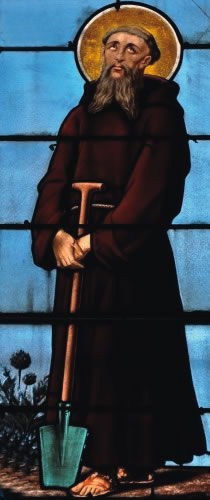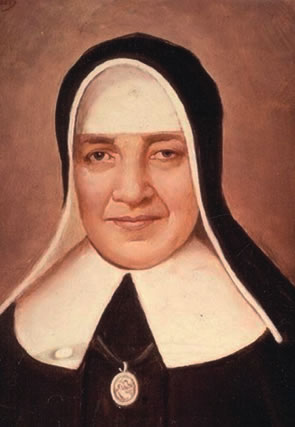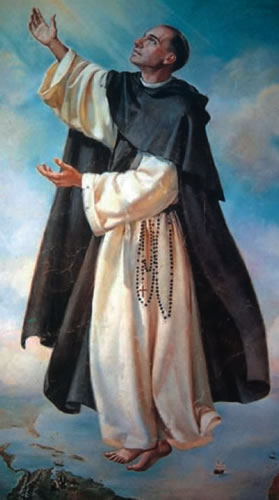September Saints
 Saint Fiacre (d. 670)
Saint Fiacre (d. 670)
Fiacre was an Abbot, born in Ireland about the end of the sixth century. Having been ordained priest, he retired to a hermitage on the banks of the Nore. Disciples flocked to him, but, desirous of greater solitude, he left his native land and arrived, in 628, at Meaux, where Saint Faro was then bishop. He was generously received by Faro, who gave him a site at Brogillum, surrounded by forests.
Fiacre built an oratory in honour of the Blessed Virgin Mary, a hospice in which he received strangers, and a cell in which he himself lived apart. He lived a life of great mortification, in prayer, fasting, vigil, and the manual labour of the garden. Disciples gathered around him and soon formed a monastery.
His fame for miracles was widespread. He cured all manner of diseases by the laying on of hands. Blindness, polyps, fevers are mentioned, and especially a tumour or fistula, since called le fic de S. Fiacre! He is the patron saint of gardeners and taxi drivers.
Saint Fiacre, obtain for us a love of solitude with God.
Source: http://www.newadvent.org/cathen/06067a.htm
 Blessed Maria Euthymia Üffing
Blessed Maria Euthymia Üffing
(1914-1955)
Emma Üffing, born in Halverde, Germany, was one of eleven children. Living in a small town, her environment consisted of her large and religious family and her parish. When only 18 months old, she was afflicted with rickets, which slowed her physical development and left her with poor health for the rest of her life. Despite this, she was a willing worker on the family farm and, whenever she could, spared her siblings any unpleasant work.
With a view to becoming a religious, Emma became an apprentice in household management in a nearby religious hospital till she returned home to nurse her father until he died in 1932. She was admitted to the Congregation of the Sisters of Charity in 1934 and took the name Euthymia. She was appointed to St Vincent’s Hospital in Dinslaken where, after passing her exams with distinction, she received a nursing diploma.
In 1943, Sister Euthymia was entrusted with the care of sick prisoners of war and foreign workers, especially those of British, French, Russian, Polish and Ukrainian nationality who had infectious diseases. She devoted herself to them with untiring care and cordiality. It was said of her: ‘She was full of a charity and kindness which came from her heart, nothing was too much for her.’
After the war, Emma was taken from care of the sick to run the laundry room. She lived her daily life in an extraordinary way. All her free time, which was usually little, was spent praying before the tabernacle. A serious form of cancer brought her to an untimely death in 1955 after long weeks of illness.
Blessed Euthymia, teach us the joy of devoting ourselves to the care of others.
Source: Internet – various
 Saint John Macias
Saint John Macias
(1585-1646)
John Macias was born in a small village in southwestern Spain. His parents, poor farmers, died when John was young, and he was raised by his uncle.
At age 16, John met a Dominican priest while attending Mass and this opened his heart to the possibility of a Dominican vocation. He began to seek God’s will for his life, and was frequently visited by the Blessed Virgin Mary and Saint John the Evangelist.
In 1622, John Macias entered the Dominican convent of St. Mary Magdalene in Lima, Peru, as a lay brother. He was the assistant Porter (doorkeeper) until his death in 1646.
One of his chief duties was to meet the poor who came to the convent seeking material or spiritual assistance. Besides his cheerful disposition and encouraging manner, John became known for the sometimes miraculous nature of his service to the poor. He worked hard to collect alms and never turned anyone away hungry. He was an instrument of conversion for many.
John was a close friend of Saint Martin de Porres, and they often met on their daily rounds of the city. They were a constant source of encouragement and ideas for one another. The two were beatified together by Pope Gregory XVI in 1837.
Saint John, teach us a true love of the poor.
 Entries(RSS)
Entries(RSS)